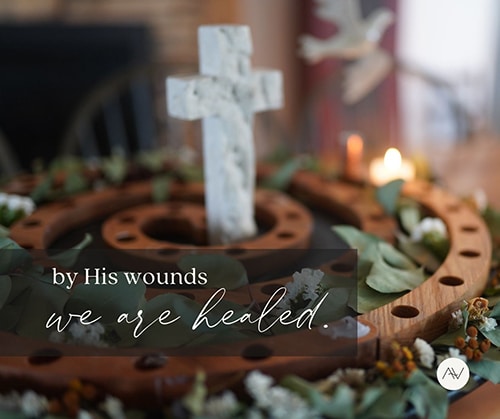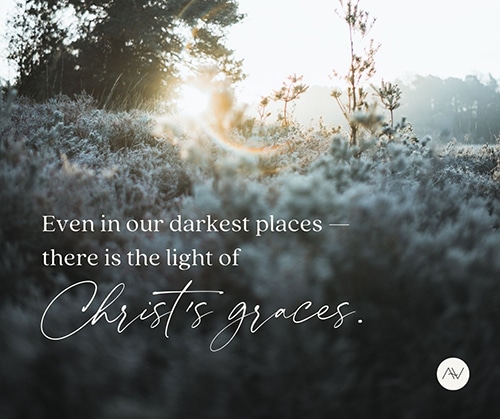Have you ever felt towards God the same way you felt towards your parents? Maybe you’ve felt angry at God like you’ve felt angry at your father. Or betrayed by God the same way your close friend betrayed you. This is not a coincidence. Our early childhood connections with our caregivers shape the way we view the world and, often, the way we view God. Today, Summer reminds us that when we can’t remember God’s love in our day-to-day lives because of our past or the chaos of daily life, we need to provide ourselves with a visual reminder. Here’s the powerful reason why – when we are firmly rooted in God’s nearness in the ordinary moments, we can rest in God’s love in the midst of life’s storms. It’s a privilege to invite Summer onto the porch today.
Guest Post by Summer Joy Gross
The presence candle was lit on my kitchen island that morning.
Every once in a while, I looked up from the computer to watch the flame flicker, remembering in the midst of my everyday-ordinary, “God, You are here.”
The kids filled the dishwasher after last night’s burgers, but left a sink full of the big pans. This was my ordinary, semi-controlled chaos. It was not cleaned up perfect. It was not scrubbed. Yet, God was in it, even in the midst of my mess, and the flicker of the candle reminded me to look for Him.
While speeding through my day, I needed a still point, like the clock on the wall that dancers keep returning to as they accomplish their turns. A visual anchor. This candle called me back, reminding me of the truth: I am never outside the warmth of God’s love.







And here’s the brain science around this practice of keeping a lit candle in a common space: by using a constant reminder of God’s presence, we’re laying the groundwork for spiritual object constancy. Object constancy is the concept of believing that an object still has reality even when it’s out of sight.
Our brains have been wired to scarcity, to absence, to loss. Sometimes our brains, through loss, have been wired to believe we will be abandoned.
Our brains need to be rewired for perfect Love. And lavish love is a new landscape we need God’s Light to find.
“Trust is built one marked experience of care after another... It takes time to establish that love is not scarce.“
At ten years old, Sofia refused to sleep when she was brought home to the States from the African orphanage. Every night was a battle. As soon as her mother walked out the door, Sofia panicked. If Sofia happened to fall asleep from exhaustion while her mom was still in the room, she would wake up multiple times throughout the night screaming for her mom’s presence. For Sofia, abandonment was not a future fear but a reality she had already experienced.
Trust is built one marked experience of care after another. Sofia, of course, hadn’t reached emotional object constancy. It takes time to establish that love is not scarce. Again, emotional object constancy means a child believes love is still present even when their caregiver has walked out of the room.
Have you ever played hide and seek with a toddler and watched them crawl out of the room looking for you while you were still sitting on the couch, a large mound covered with a blanket? When you pulled that blanket over your head, the little one no longer believed you were present. They have not yet achieved object permanence.
It takes thousands of interactions of faithful loving care for a child to achieve emotional object constancy.
Each time a caregiver responds consistently to a cry, each soothing voice, each nighttime rocking, each cry of delight gets stored in the brain and builds a neural pathway that creates a sense of security.
It’s transferred through the senses. We feel arms wrapped around us. We see the tender gaze of love. We hear the soothing voice of the caregiver. We taste milk. Over time, the love of the caregiver is stored up within the child, and the child is given a sense that they are living in a safe and secure world. Their brains are wired to believe love is consistent and care is plentiful.
“Love was a visual anchor when she was experiencing fear’s raging storm.“
Exhausted, Sofia’s mom called her adoption services representative. She suggested that Diana prove that she was still thinking about her daughter throughout the night and show her daughter that she was safe. So Diana strung a wire above Sofia’s bed and throughout the evening and occasionally at night, she would sneak into the room and clip a small, pink construction paper heart onto the wire. If Sofia woke up, she could visually see that she had not been abandoned, that her mom was thinking loving thoughts toward her during their separation.
Love was a visual anchor when she was experiencing fear’s raging storm.
After a few weeks of pinning hearts, Sofia was able to sleep through the night peacefully. Sofia’s trust grew one pink construction paper heart at a time.





Throughout history, God provided object constancy through visuals of His presence.
As He provided a way out of slavery, the presence of God led the Israelites through the desert via a pillar of cloud by day and fire by night. As they looked toward the tabernacle, they saw the glow of presence. As they collected manna on the ground and stood up, straightening their backs, they held provision. They tasted provision.
“A secure attachment is built first on the foundation of our Emmanuel’s presence. Sensory reminders of His presence can anchor us through life’s storms.“
The Lord knew the people of Israel would need a constant reminder of His nearness in order to begin to build attachment. A secure attachment is built first on the foundation of our Emmanuel’s presence. Sensory reminders of His presence can anchor us through life’s storms.
These days I live in the suburban sprawl around the city of Atlanta. I light the presence candle on my kitchen island and it surprises me awake.
“You are here,” I whisper as I touch the flame of the match to the wick.
And sometimes , that’s it. Nothing more. Just assent. I need a visual reminder that no matter where my attention strays, God’s Emmanuel promise stays the same.
Other times the flicker awakens need, repentance, a heart turned back toward His heart after I’ve eaten at a table set by scarcity.
When we’re in a slumber of inattentiveness, we believe the lie of abandonment. We believe we’re alone, pickaxing for provision, mining for love. We miss the truth that the God who made the universe is actively pursuing our hearts, carrying the cross on his shoulders along the Via Dolorosa, the Way of Love. He was dying for desire for us.
Our Emmanuel has been fighting our separation from day one.
He has been pursuing YOUR presence from day one.

Summer Joy Gross (MDiv, Virginia Theological Seminary) is an Anglican priest, retreat leader, and spiritual director whose work is guided by the belief that our stories can be transformed by God’s invitation to make His love our home base. She is associate faculty of spiritual formation and the art of spiritual direction at the Healing Care Ministries’ spiritual direction school. She is the host of The Presence Podcast and lives in North Georgia with her husband, their three teenagers, and their Brittany Spaniel, who points lawn ornament rabbits around their suburban neighborhood. Connect with her online at AThirstForGod.com and on Instagram @RevSummerJoy.
In The Emmanuel Promise, Summer helps us to explore the attachment stories which may be impacting your relationship with God and also gives us simple repeatable tools to help us build a secure attachment. Drawing from the deep well of Scripture, attachment theory, and her own personal story, she invites you to experience Emmanuel, God-with-us, as the One whose love toward you is secure and unchanging.
{Our humble thanks to Baker Books for their partnership in today’s devotional.}







